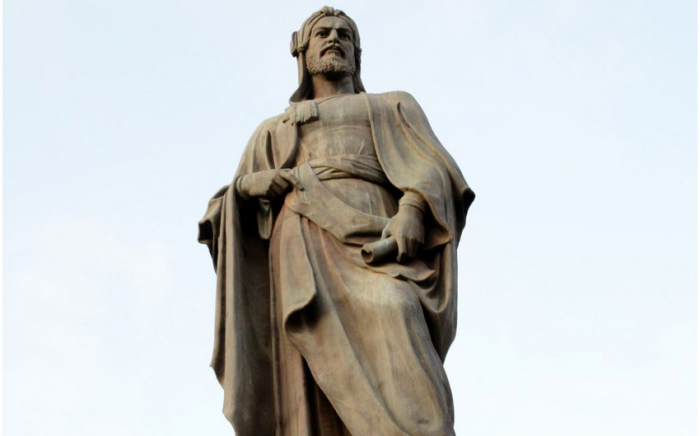Nizami Ganjavi, a great name in Azerbaijan reflects the strength of wisdom, diversity and uniqueness. His extensive contributions by his knowledge and poetry serve as a great literacy treasure for all humanity. Azerbaijan’s unique spiritual literature is a heritage established by the legacy of Ganjavi.
He was born in 1141 in Ganja, one of the ancient and culturally rich hubs of Azerbaijan. His real name was Ilyas Ibne Yusif. He acquired his early education from top Madrassas of Ganja and was taught by the most influential mentors. Nizami was among the renowned poets of the 12th century. His dedication, remarkable writing, contribution towards humanity, and quest for Knowledge have made him the greatest intellectual/spiritual poet not only in Azerbaijan but also in the world. Neither words nor writing can demonstrate the value and glorification of Nizami. His words are like the treasures of precious gems taken from the Ganja mines. Nizami Ganjavi had an admirable personality amid the understanding of universal dynamics. He began to write at the age of thirty.
He presented the perfect humanistic formula to endure the happening in the world with kindness and intellect. By exploring literature, we have often found that some characteristics are majorly attributed to the writings of poets. Among them, is the strong humanistic influence of art to rise above the environment, defined by the mysticism and prejudices of patriarchal feudalism. In this aspect, Nizami Ganjavi, the incredible representative of the Eastern Renaissance, has gifted the world with his innovative philosophy and immortal work, ‘’Khamsa’’ or ‘’Quintet’’ (Five) via his aesthetic talent. He marked his name in the annals of art with the five poems. In the Khamsa poems, Nizami described a range of natural phenomena, which were proved later by different scientists as well. Khamsa laid the core foundation for the great Nizami school of literature which continues to exert its influence.
The significant contributions are mentioned as follows:
• The Treasury of Mysteries (1174)
• Khosrov and Shirin (1180)
• Leyli and Majnun (1188)
• Seven Beauties (1197)
• The book of Alexandra (1203)
Poetry from a Magnificent Sage:
In contemporary times, Nizami’s place as the national poet of Azerbaijan is firmly established. His name is everywhere and on everything – from museums to commemorative coins and from exhibitions to cultural centers. Ganjavi, the pride of Azerbaijan, began his journey by writing lyrics in short forms, i.e., qasida, gazal, rubai, but soon compiled an anthology-Divan, and gained fame as a favorite and esteemed poet not only in the Near and the Middle East but also on distant shores. The epicenter Ganja provided conducive environment to Nizami to study science, art, culture, mathematic, Islamic theology, ethics, philosophy, and Persian and Arab literature. These learnings are also reflected in his contribution towards establishing a rich heritage, followed by a great legacy.
He opened the door for high intellect, spiritual knowledge, and cognitive thinking. His creative synthesis for progressive humanist thought and inimitable poetic art remained intact and popular over the following centuries. Nizami was the prominent pioneer of the vernacular language in poetry. He introduced innovative concepts and established a new literary form. His literary impact spanned to Iran, Turkey, Central Asia, and India, where poets imitated Nizami’s Khamsa in multiple forms and themes. Afterward, great poets such as Jami, Amir Khusro, Alisher Navoi, and Fuzuli were all heavily influenced by Nizami. His masterpieces have been translated into English, German, Spanish, Italian, Japanese, Russian and other foreign languages. The rare manuscript copies of his works are preserved like precious pearls in famous libraries, museums and literary foundations in cities worldwide such as Baku, Moscow, St. Petersburg, Tashkent, Tabriz, Tehran, Cairo, Istanbul, Delhi, London, Paris, and others.
Pride of Azerbaijan, Nizami: A Poet for all Humanity
Humanity and kindness were the very motives behind Ganjavi’s teachings and were close to his heart. He regarded the universal principles as his sacred goal to apply creativity to serve the people. He has played a substantial role in humanity’s moral development and progress. Nizami’s contribution to mankind is exceptional and cannot be overlooked. The Nizami Museum of Azerbaijan Literature, Baku, Azerbaijan, has been doing a significant job. The museum was established in 1939. The main goal is to collect, research and store scientific and other materials about the country’s literature and culture along with the presentation of these materials on expositions and exhibitions. Moreover, the Nizami Ganjavi International Center has been proactive and forthcoming to familiarize the work of the genius ’Son of Azerbaijan’(Nizami) with the world. Azerbaijan can never forget its national heroes, poets, writers, and philosophers. No doubt, Nizami Ganjavi is a great name that has marked history by his extensive contributions to humanity. His work will always enlighten the coming generations with his great legacy.
‘’In the book of life every page has two sides: we human beings fill the upper side with our plans, hopes, and wishes, but providence writes on the other side, and what it ordains is seldom our goal’’(Nizami Ganjavi).
Maryam Raza is a Research Executive, Center for Global & Strategic Studies (CGSS), Islamabad, Pakistan.
More about:
















































